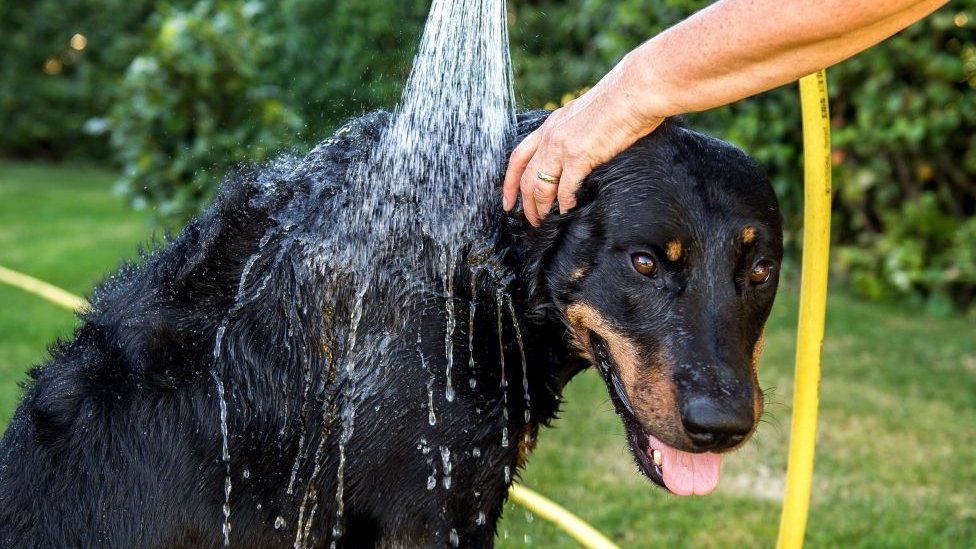UK heatwave: How to keep animals safe
- Published

The RSPCA advises making sure dogs have plenty of fresh water, as they aren't able to regulate their body temperature in the same way as people can
As temperatures continue to soar, livestock and pets require greater care than usual. A previously "fit and healthy" dog died recently in Greater Manchester from heatstroke after a morning walk. So what can you do to keep animals safe?
For many four-legged, finned or furry friends, the prolonged warm and dry weather can cause problems. The RSPCA has received hundreds of calls over recent days about animals suffering from heat exposure.
Dogs in particular struggle in the hot weather because they are not able to cool down through sweating, as humans do, and those breeds with long coats are especially prone to overheating.
A five-year-old German Shepherd was put down on Friday after suffering heatstroke following a walk. The RSPCA said the owner had been throwing a ball for their pet when the dog became ill, began suffering seizures and had to be put down.
The RSPCA has released a series of tips for keeping animals safe and comfortable during the heatwave., external
Five ways to keep your dog cool this summer
These include avoiding leaving animals in hot cars, conservatories, outbuildings or caravans, which, even just for a short while, can be fatal due to rising temperatures.
It also says it is best to walk a dog early in the morning or late in the evening when it is cooler, as paws can burn on a hot pavement. Exercise can also increase the risk of heatstroke.
For anyone popping on suncream, it might also be important to put some on your pet.
Animals' exposed spots, such as ears and noses, are vulnerable to sunburn and - just like people - sun damage can lead to skin cancer.
Gareth Parry, from Shropshire, said his cat Mr Smith developed pre-cancerous cells on his ears, where his hair was most fine.
Mr Smith's owner regularly had to suncream his ears, as white cats are more prone to developing skin cancer
Mr Parry, 39, said: "His ears were almost completely pink because his hair was so white. His ears were practically bald.
"We used to have to put sun cream on every time he went outside."
The Blue Cross said white cats were at a higher risk of developing skin cancer from sunlight exposure than others., external
And horses are also at risk of being burned by the fierce sun.
Gemma Stanford, director of welfare for The British Horse Society, said: "Like paler-skinned and fair-headed humans, horses with flesh-coloured skin and grey or white hair are most susceptible to burning.
"Their noses are particularly sensitive to the sun."
Horses also need suncream to prevent against burning
Even some breeds of cow can get sunburn on their noses - although the NFU said it was quite rare.
For farmers with livestock, the main problem could be a lack of food as, without rain, there is poor grass growth.
Mike Thomas, a spokesman for the NFU, said: "We set up a fodder bank, so members who are having problems can get in touch
"And members can help each other, someone who has a surplus of feed, can sell it on to other farmers.
"But animals are used to being out in all weathers, cows will naturally migrate to where the shade is and farmers will be putting out more water for them in their fields."
The NFU said cows will naturally move into shadier spots during the heatwave
But there are plenty of ways to keep pets cool.
At the RSPCA Block Fen Animal Centre in Cambridgeshire, the staff have been keeping the animals cool with iced treats and a paddling pool.
Its staff advise freezing treats or water to give pets their own "ice cream", while they also say damp towels for your pet to lie on or an ice pack wrapped in a towel could provide a welcome relief from the heat.
And what about more exotic animals?
West Midlands Safari Park staff have been hosing down ostriches and feeding giraffes ice lollies to help them cope with the heat.
Giraffes handed lollies at West Midlands Safari Park
But even wildlife can struggle during the warm weather.
Fish rescue teams have been out at the top of the Teme, near Leintwardine in Herefordshire, where the drying river is causing problems for its resident trout.
The Environment Agency workers were out moving the fish to a more healthy flow downstream.
Dave Throup, from the agency, external said: "It does dry out, it has a history of drying out, it doesn't happen every year, but when you get a lengthy dry period. What is different this time is that it has dried out very quickly.
"We have had to rush out to rescue the fish, as the river drops into the gravel, it leaves large pools so the fish get stranded and they can't get downstream.
"The oxygen levels are dropping, the water is warming up, and the herons can see them. Unless we go in, they would die."
Get in touch
It's not just animals who are finding it difficult to cope in the heat - what tips do you have for staying cool?
Send us your ideas and we could be in touch.
If you are reading this page on the BBC News app, you will need to visit the mobile version of the BBC website to submit your question on this topic.
- Published2 July 2018
- Published26 June 2018